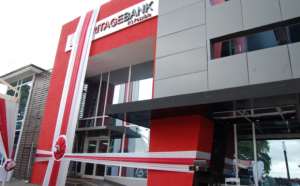
Bank of Ghana(BoG) has disclosed that Heritage Bank had a questionable and suspicious stated capital hence its decision to revoke their license, aside their inability to meet the new 400 million minimum capital requirement.
Addressing a press conference after completing reforms in the banking sector on January 4, 2019, Governor of the Bank of Ghana, Dr. Ernest Addison, announced that “the bank's capital appears to have come from sources which are suspicious”.
Mr. Addison explained that in the application for a banking licence, each shareholder of Heritage needed to demonstrate their “ability to subscribe to the shares” of the bank, however, the Bank of Ghana was not satisfied that the original sources of the bank's capital are acceptable, in terms of section 9 (d) of the Banking and the Anti-Money Laundering Act which requires acceptable capital to be obtained from lawful and transparent sources.
Seidu Agongo and COCOBOD
Recounting how the bank obtained its licenses, Dr. Addison said the promoters of Heritage bank provided evidence to Bank of Ghana at the time of the application for a banking licence to the effect that an amount totaling GHC 120.6 million was lodged with a local bank.
“The amount of GHC 120 million was transferred to the bank from Agricult, a company wholly owned by Seidu Agongo, a promoter of Heritage, which funds appear to have been derived from contracts awarded to Mr. Agongo by COCOBOD, and are currently the basis of criminal prosecution in the High Court of Ghana”.
“Meanwhile, it has come to the notice of the Bank of Ghana that the bank has yet to respond to two High Court orders for disclosures relating to these and other contracts affecting the significant shareholder Mr. Agongo. While Mr. Agongo claimed that his sources of capital for the bank included proceeds of a USD 19.25m contract with COCOBOD, Bank of Ghana's subsequent investigations have shown that there was no such contract between COCOBOD and Mr. Adongo” Dr. Addison said.
The Governor continued that one or more contracts executed however existed between COCOBOD and Sarago Limited, even though documents submitted to the Bank of Ghana for licensing of the bank made no mention of the contract between COCOBOD and Sarago nor the fact that Sarago—also a shareholder of the bank was owned by Mr. Agongo.
“From its 2017 audited financial statements, an amount of GHc15.8m was transferred to the bank from an unnamed investor which was attributed to unpaid called-up share capital, calling into question whether the minimum capital of the bank had been fully paid up at the time of licensing”.
Unnamed financiers
Dr. Addison observed that from the same financial statements, an operating loss was booked resulting in a shortfall of GHC 20.6 million in the bank's capitalization.
“This was expected to be repaid by an unnamed shareholder through a transfer of fixed assets (branches) to the bank. Despite attempts by the Bank of Ghana to confirm the identity of the unnamed shareholder, the basis of valuation of the fixed assets, and whether the terms of the transactions were at arms' length, and otherwise acceptable, the bank and its shareholders, directors, and management have failed to clarify matters”.
Making more revelations, Dr. Addison stated that certain shares of the bank were held by nominee shareholders whose ultimate beneficial shareholders were not disclosed to the Bank of Ghana.
He reveled that the shareholder on record for Sarago is one Ruth Leena Abazerri, although the Bank of Ghana has reasonable grounds to believe that it is owned by Seidu Agongo.
“This is in breach of section 9 of the Anti-Money Laundering Act which requires the disclosure of beneficial ownership of shares, as well as regulation 9 of the Anti-Money Laundering Regulations (L.I. 1987) which requires that beneficial owners are not fictitious. Several related party transactions were entered into between the bank and entities owned or controlled by its significant shareholder Mr. Agongo such as Sassh Alliance, Moor Company Limited, and Kedge Company Limited, on terms and conditions that remain unclear and/or not transparent”.
Dr. Addison stressed that despite all these, the bank could not meet the GHC 400 million capital required as of 31st December 2018.
Minimum capital: Banks in Ghana reduced from 34 to 23
Ghana's financial space will now have only 23 banks , down from the 34 that were operating in the country as of January 2017.
Source: citibusinessnews.com | Ghana




 2024 elections: Resign if you can't be faithful to party - Sagnarigu NDC PC desc...
2024 elections: Resign if you can't be faithful to party - Sagnarigu NDC PC desc...
 Five arrested, remanded over alleged murder of two police officers at Transacco
Five arrested, remanded over alleged murder of two police officers at Transacco
 Tax exemptions better than incentives for churches – Tax Analyst tell Bawumia
Tax exemptions better than incentives for churches – Tax Analyst tell Bawumia
 Transport Minister sues Law Platform Editor for defamation
Transport Minister sues Law Platform Editor for defamation
 Voter registration: Police arrest NPP Treasurer for Mpohor for registering minor
Voter registration: Police arrest NPP Treasurer for Mpohor for registering minor
 "This nonsense must stop" — Lawrence Tetteh vows to march to Jubilee House over ...
"This nonsense must stop" — Lawrence Tetteh vows to march to Jubilee House over ...
 2024 elections: “If indeed you stand for peaceful elections the time is now for ...
2024 elections: “If indeed you stand for peaceful elections the time is now for ...
 I have the attributes to be president of this country — Bernard Monarh
I have the attributes to be president of this country — Bernard Monarh
 Cecilia Dapaah saga: ‘Turf war’ between AG, EOCO, OSP indicates they’re not ‘cor...
Cecilia Dapaah saga: ‘Turf war’ between AG, EOCO, OSP indicates they’re not ‘cor...
 Ghana will become the first African country to embrace blockchain-powered gover...
Ghana will become the first African country to embrace blockchain-powered gover...
